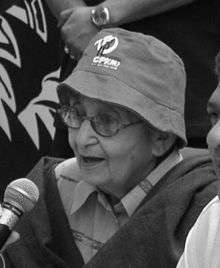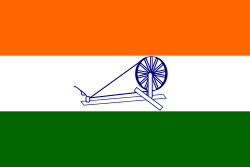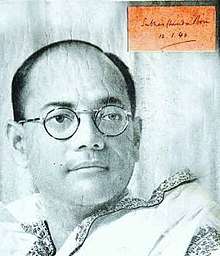Lakshmi Sahgal
Lakshmi Sahgal (![]()
Lakshmi Sahgal | |
|---|---|
 Captain Lakshmi | |
| Born | Lakshmi Swaminathan 24 October 1914 |
| Died | 23 July 2012 (aged 97) |
| Nationality | Indian |
| Alma mater | Queen Mary's College, Madras Medical College |
| Known for | Revolutionist, independence activist, Marxist |
| Spouse(s) | P. K. N. Rao ( - 1940) Prem Kumar Sahgal (1947–1992) (his death) |
| Children | Subhashini Ali, Anisa Puri |
Early life
Sahgal was born as Lakshmi Swaminathan in Malabar present Anakkara, Pattambi In Kerala on 24 October 1914 to S. Swaminathan, a lawyer who practised criminal law at Madras High Court, and A.V. Ammukutty, better known as Ammu Swaminathan, a social worker and independence activist from an aristocratic Nair family known as "Vadakkath" family of Anakkara in Palghat, Kerala.[1] She is the elder sister of Mrinalini Sarabhai.[2][3]
Sahgal studied in Queen Mary's College[1][4] and later chose to study medicine and received an MBBS degree from Madras Medical College in 1938. A year later, she received her diploma in gynaecology and obstetrics.[5] She worked as a doctor in the Government Kasturba Gandhi Hospital located at Triplicane Chennai.[1]
In 1940, she left for Singapore after the failure of her marriage to pilot P.K.N. Rao.[1] During her stay at Singapore, she met some members of Subhas Chandra Bose's Indian National Army.[1]
The Azad Hind Fauj
In 1942, during the surrender of Singapore by the British to the Japanese, Sahgal aided wounded prisoners of war, many of whom were interested in forming an Indian independence army. Singapore at this time had several nationalist Indians working there including K. P. Kesava Menon, S. C. Guha and N. Raghavan, who formed a Council of Action. Their Indian National Army, or Azad Hind Fauj, however, received no firm commitments or approval from the occupying Japanese forces regarding their participation in the war.[6]
It was against this backdrop that Subhas Chandra Bose arrived in Singapore on 2 July 1943. Lakshmi had heard that Bose was keen to draft women into the organisation and requested a meeting with him from which she emerged with a mandate to set up a women’s regiment, to be called the Rani of Jhansi regiment. Women responded enthusiastically to join the all-women brigade and Dr. Lakshmi Swaminathan became Captain Lakshmi, a name and identity that would stay with her for life.[6]
The INA marched to Burma with the Japanese army in December 1944, but by March 1945, with the tide of war turning against them, the INA leadership decided to beat a retreat before they could enter Imphal. Captain Lakshmi was arrested by the British army in May 1945, remaining in Burma until March 1946, when she was sent to India – at a time when the INA trials in Delhi heightened popular discontent with and hastened the end of colonial rule.[6]
Later years
In 1971, Sahgal joined the Communist Party of India (Marxist) and represented the party in the Rajya Sabha. During the Bangladesh crisis, she organised relief camps and medical aid in Calcutta for refugees who streamed into India from Bangladesh. She was one of the founding members of All India Democratic Women's Association in 1981 and led many of its activities and campaigns.[7] She led a medical team to Bhopal after the gas tragedy in December 1984, worked towards restoring peace in Kanpur following the anti-Sikh riots of 1984 and was arrested for her participation in a campaign against the Miss World competition in Bangalore in 1996.[6] She was still seeing patients regularly at her clinic in Kanpur in 2006, at the age of 92.[6]
In 2002, four leftist parties – the Communist Party of India, the Communist Party of India (Marxist), the Revolutionary Socialist Party, and the All India Forward Bloc – nominated Sahgal as a candidate in the presidential elections. She was the sole opponent of A.P.J. Abdul Kalam, who emerged victorious.[8]
Personal life
Sahgal married Prem Kumar Sahgal in March 1947 in Lahore. After their marriage, they settled in Kanpur, where she continued with her medical practice and aided the refugees who were arriving in large numbers following the Partition of India. They had two daughters: Subhashini Ali and Anisa Puri.
Subhashini is a prominent Communist politician and labour activist. According to Ali, Sahgal was an atheist. The filmmaker Shaad Ali is her grandson.[9]
Death
On 19 July 2012, Sahgal suffered a cardiac arrest and died on 23 July 2012 at 11:20 A.M. at the age of 97 at Kanpur.[10][11] Her body was donated to Ganesh Shankar Vidyarthi Memorial Medical College for medical research.[12]
Awards
In 1998, Sahgal was awarded the Padma Vibhushan by Indian president K. R. Narayanan.[13]
References
- Kolappan, B. (24 July 2012). "A fulfilling journey that began in Madras". The Hindu. Chennai, India. Retrieved 24 July 2012.
- "The legacy of Mrinalini Sarabhai's family". The Indian Express. 11 May 2018. Retrieved 22 October 2019.
- Menon, Parvathi (23 July 2012). "Captain Lakshmi Sahgal (1914 - 2012) - A life of struggle". The Hindu. Retrieved 23 October 2019.
- Asha Krishnakumar (2003). "The end of a women's college?". Frontline. 20 (08).
- "Capt Lakshmi Sehgal, chief of INA women's regiment, passes away at 97". The Telegraph. Calcutta, India. 23 July 2012. Retrieved 23 July 2012.
- Menon, Parvathi (23 July 2012). "Captain Lakshmi Sahgal (1914 - 2012) - A life of struggle". The Hindu. Chennai, India. Retrieved 23 July 2012.
- "Lakshmi Sehgal". Tamilnadu.com. 24 January 2013. Archived from the original on 11 April 2013.
- "Freedom fighter Captain Lakshmi Sehgal dead". Deccan Chronicle. 23 July 2012. Retrieved 23 July 2012.
- "Freedom fighter Captain Lakshmi Sehgal passes away". The Times Of India.
- "Captain Lakshmi Sahgal passes away". The Times Of India. 23 July 2012.
- PTI (23 July 2012). "Exemplary life: Capt Lakshmi Sehgal met patients till the end". The Hindu. Retrieved 31 March 2014.
- TAPAS CHAKRABORTY (24 July 2012). "Lakshmi Sehgal no more". Telegraphindia.com. Retrieved 31 March 2014.
- "Lakshmi Sahgal (1914-2012)". The Hindu. 23 July 2012.
- Subhashini Ali Lakshmi Sahgal: A life in service
- Indra Guptha India's 50 Most Illustrious Women ISBN 81-88086-19-3
- Peter Fay The Forgotten Army: India's Armed Struggle for Independence, 1942-1945
External links
| Wikimedia Commons has media related to Lakshmi Sahgal. |
- Lakshmi Sehgal: A life of struggle and sacrifice - by Sambhavika Sharma
- Rediff interview 2002
- The Pioneers: The Pioneers: Dr. Lakshmi Sehgal
- Indian Express Interview: Despite differences, India is one: Captain Laxmi Sehgal
- Freedom fighter Captain Lakshmi Sahgal dies, NDTV
- Captain Lakshmi, The Economist, 4 August 2012

